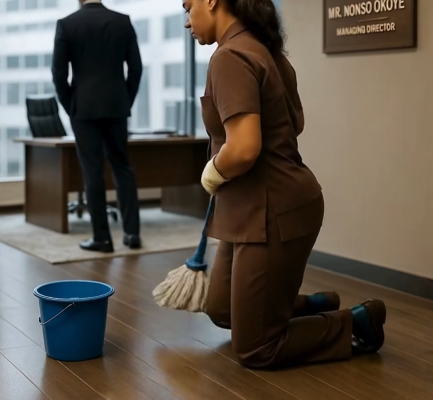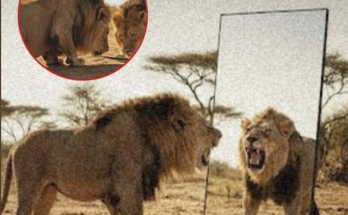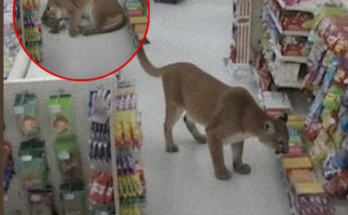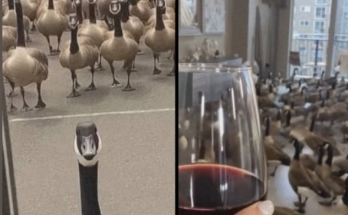“Sometimes, the dust you clean is the same dust you swallow to survive. And silence, the only legacy you leave to an invisible child.”
My name is Lucia. This is the story of how, for years, I swept the office of a man who never knew his biggest mistake had a name, a face—and a grave.
I was seventeen when I found out I was pregnant. It was my final year of high school in Enugu. I had dreams—finishing my studies, finding a better life. He was my deskmate, Nonso Okoye. Always charming, confident, the son of a well-off family. I was the shoemaker’s daughter, born to a mother who sold bananas in the market.
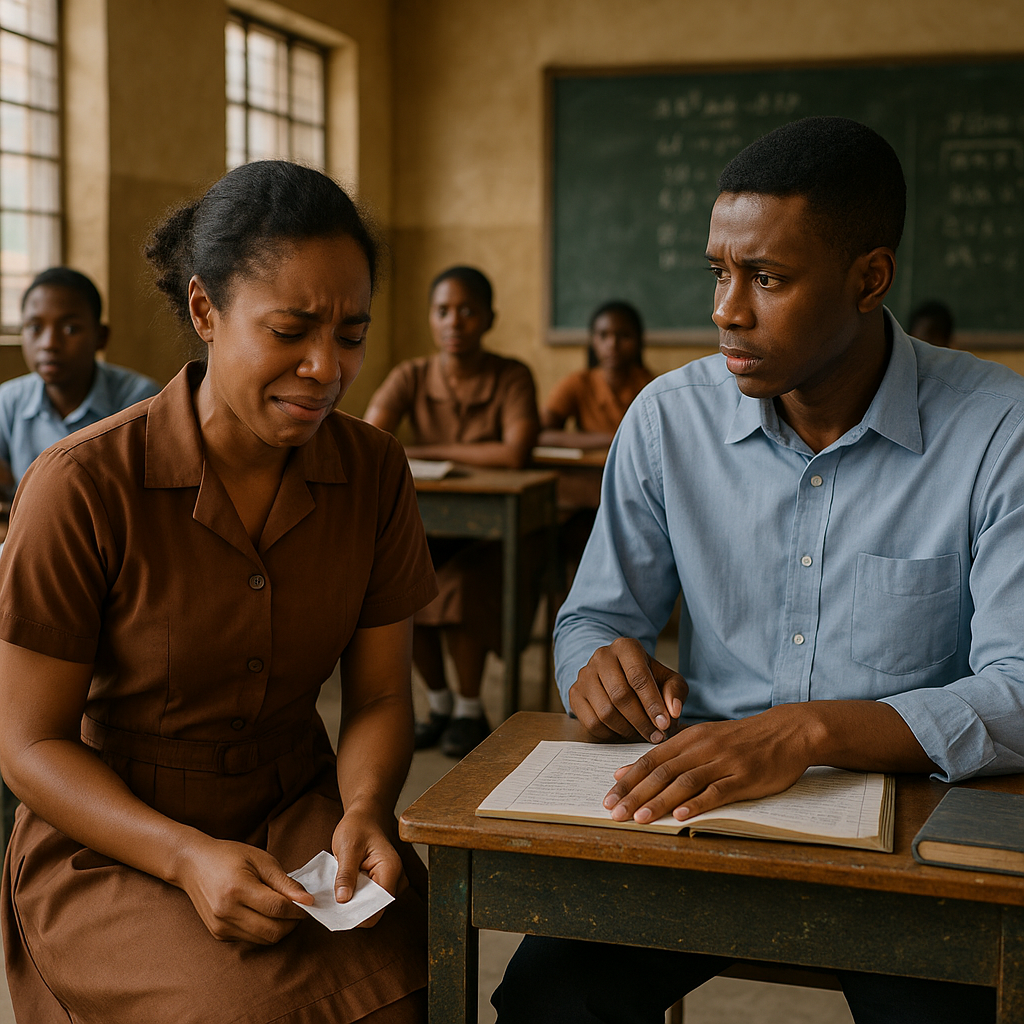
The day I told him I was pregnant, he froze.
“Are you sure?” he whispered.
“I haven’t been with anyone else, Nonso. He’s yours.”
He never spoke to me again. Days later, I learned his parents had sent him to study in the UK.
One morning, my mother found the doctor’s letter in my backpack.
“You want to shame us? Find the father!” she shouted.
“Mom, I have nowhere else to go…”
“Then leave. There’s no place for sinners here.”
I was left alone. Pregnant, terrified. I slept in unfinished buildings, washed other people’s clothes, sold oranges in the market. When labor came, I gave birth under a mango tree behind the old midwife Doña Estela’s stall.
“Hang in there, baby. Almost there,” she whispered, wiping the sweat from my brow.
The baby was born silently, my fists clenched tight.
“What will you name him?”
“Chidera,” I whispered. “Because what God has written, no one can erase.”
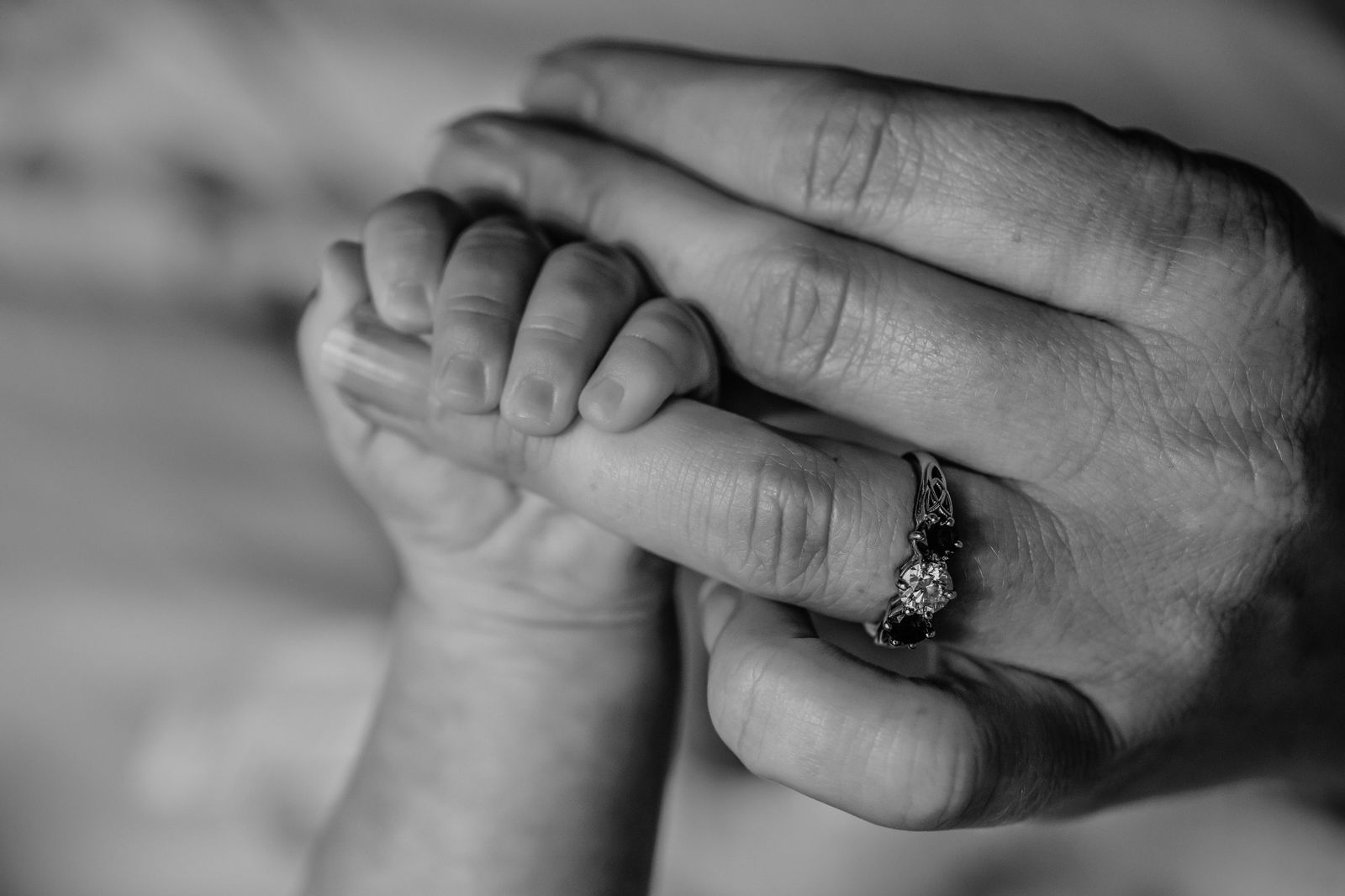
Life became a battle. Chidera and I shared borrowed mattresses, cold nights, and hungry days. When he turned six, he asked:
“Mom, where is my dad?”
“He traveled far, son. One day he’ll come back.”
“Why doesn’t he call?”
“Maybe he lost his way.”
But he never came.
When Chidera was nine, he fell ill. Fever, coughing, fatigue. The doctor said:
“It’s a simple operation. But it’ll cost sixty thousand naira.”
I didn’t have it. I sold my ring, my radio, begged for loans. Still, it wasn’t enough.
I buried my son alone, wrapping him in a blue blanket beside a torn photo of his father.
“Forgive me, son. I didn’t know how to save you.”
Five years passed.
I moved to Lagos, seeking a new beginning. I got a job as a night cleaner at G4 Holdings, a tech company on Victoria Island.
“Brown uniform. Night shift. Don’t speak to the executives. Just clean,” the supervisor said.
On the seventh floor was a large office with gold handles and thick carpet. The nameplate read:
“Mr. Nonso Okoye – Managing Director.”
I felt my knees buckle.
“It can’t be…” I whispered, gripping my mop tightly.
Nonso had changed. Taller. Broader. Expensive suit. Designer cologne. But his eyes were the same—sharp, proud, as if the world owed him something.
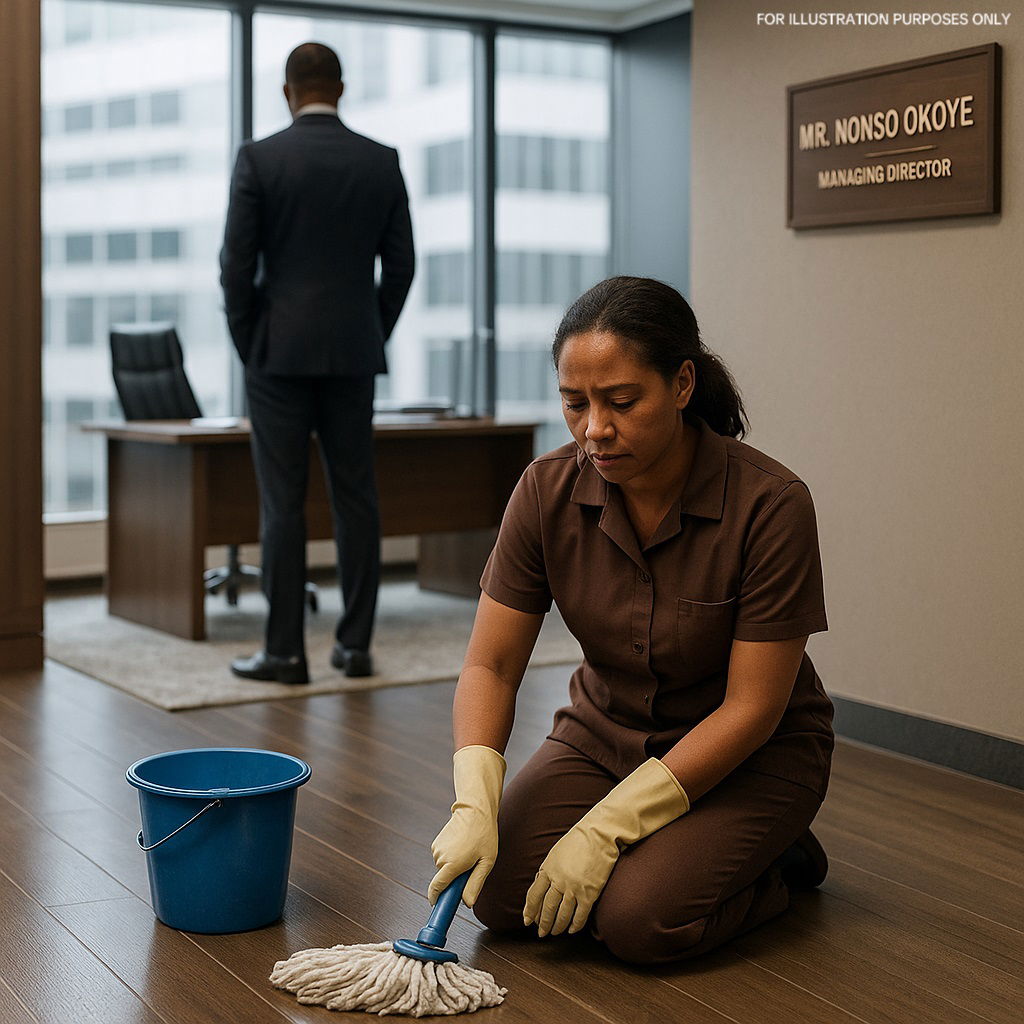
I cleaned his office every night. I arranged his papers, polished his glass table, emptied his bin. He never looked at me twice.
One afternoon, as he moved some files, my name badge fell to the floor.
“Lucia?” he read aloud. “Does your name ring a bell? You worked in Enugu before?”
I forced a small smile. “No, sir.”
He didn’t push. Just returned to his laptop, as if I were invisible.
That night, I overheard him in the conference room laughing with colleagues:
“I once got a girl pregnant in high school,” he chuckled. “She said it was mine. But you know how poor girls are—they’ll say anything.”
They all laughed.
I dropped the mop and ran to the bathroom, sobbing for an hour.
“Why, God? Why me?”
That night, I wrote a letter—my hands shaking:
“You may not remember me, but I remembered you every night as I watched our son gasp for air. You never came back. But I cleaned up your mess daily—both in life, and now, on your floor.”
I folded it and slid it beneath his mug on his desk.

The next day, I requested to be transferred. I couldn’t bear to see him again.
Two weeks later, a woman came to my door. She wore white, elegant and graceful. Her face reminded me of Nonso, but softer.
“Are you Lucia?”
“Yes, ma’am.”
“I’m Nonso’s older sister.”
I froze.
“He cried when he read your letter. He didn’t know. Our parents told him you had an ab0rtion.”
“No,” I said quietly. “Chidera lived for nine years. He d.ied waiting for his father.”
She wiped her eyes with a handkerchief.
“Nonso went to the cemetery. He found your son’s grave. He wants to see you—not to apologize, but to atone.”
We met at the cemetery, under the same mango tree where I had once buried my boy.
Nonso arrived silently, his shoulders heavy.
“Lucia…”
“Don’t say anything.”
He knelt beside the grave and wept like a child.
“Forgive me, son. You were never a mistake.”
We planted a tree beside the gravestone.
“What would you have wanted Chidera to become?” he asked.
“A good man,” I said. “Like the one you still have a chance to be.”
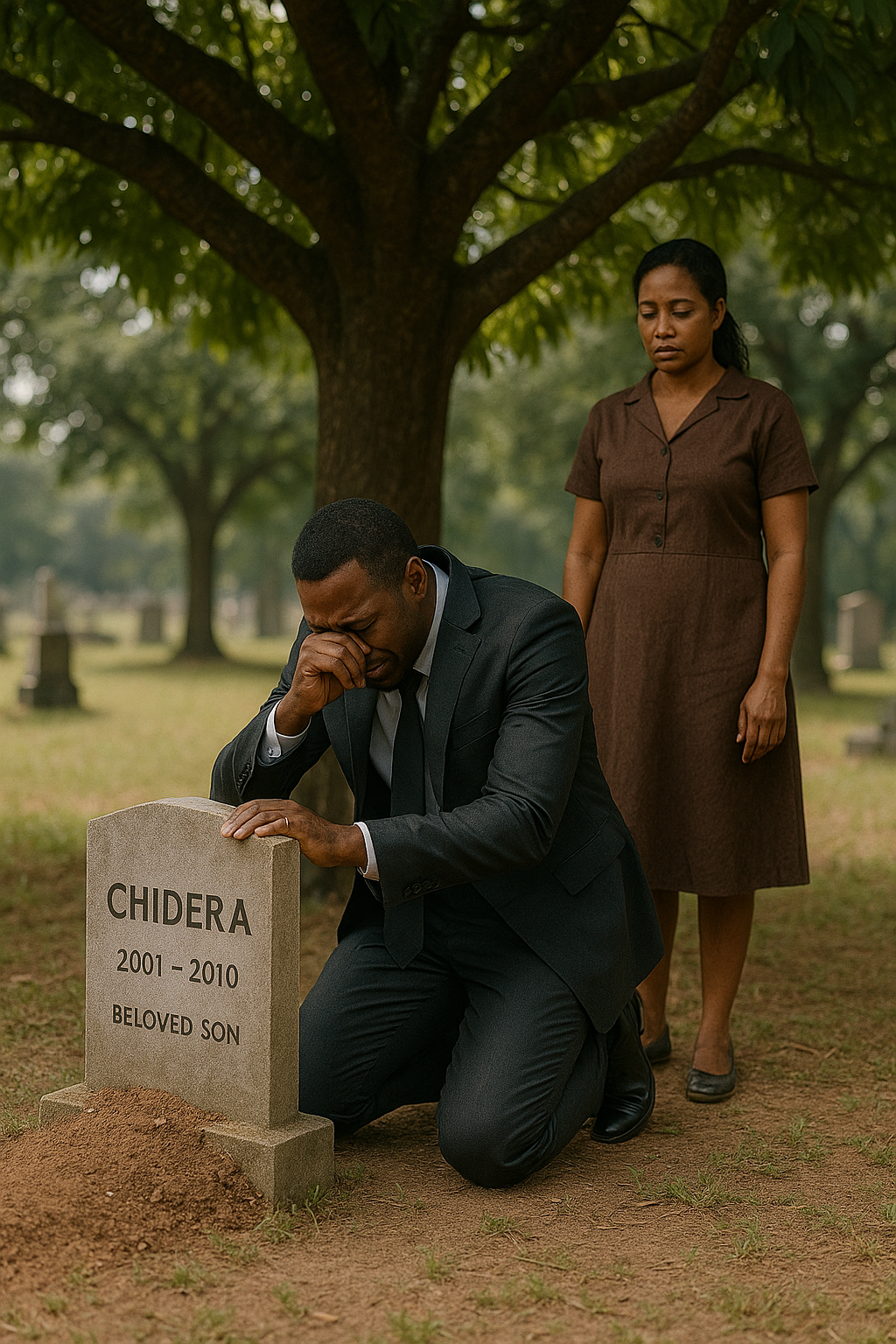
From that day forward, Nonso changed.
He funded a school for girls expelled due to teen pregnancy. He called it “Chidera’s House.”
“No girl should go through what you did,” he said, inviting me to visit.
The building is simple, but full of laughter. There’s a mural of a mother lifting her child to the sky.
Nonso sends me a monthly allowance. I never asked for it.
“It’s not charity, Lucia. It’s justice.”
I still live simply. I cook, sweep, and wash clothes. But I sleep better now.
I told my story. And someone finally listened.
Now, when I walk through the schoolyard and see the girls learning, I think about how far I’ve come.
One day, a girl with long braids and a shy smile asked me:
“Are you Chidera’s mom?”
“Yes, sweetheart. Why?”
“I want to be like you—strong, even when I’m afraid.”
I hugged her.
“You already are. You just have to believe it.”
Sometimes Nonso calls to ask how the girls are doing. He talks less now. He listens more.
“Thank you, Lucia,” he said once. “For giving me a second chance at being a father—even if it’s to children who aren’t mine.”
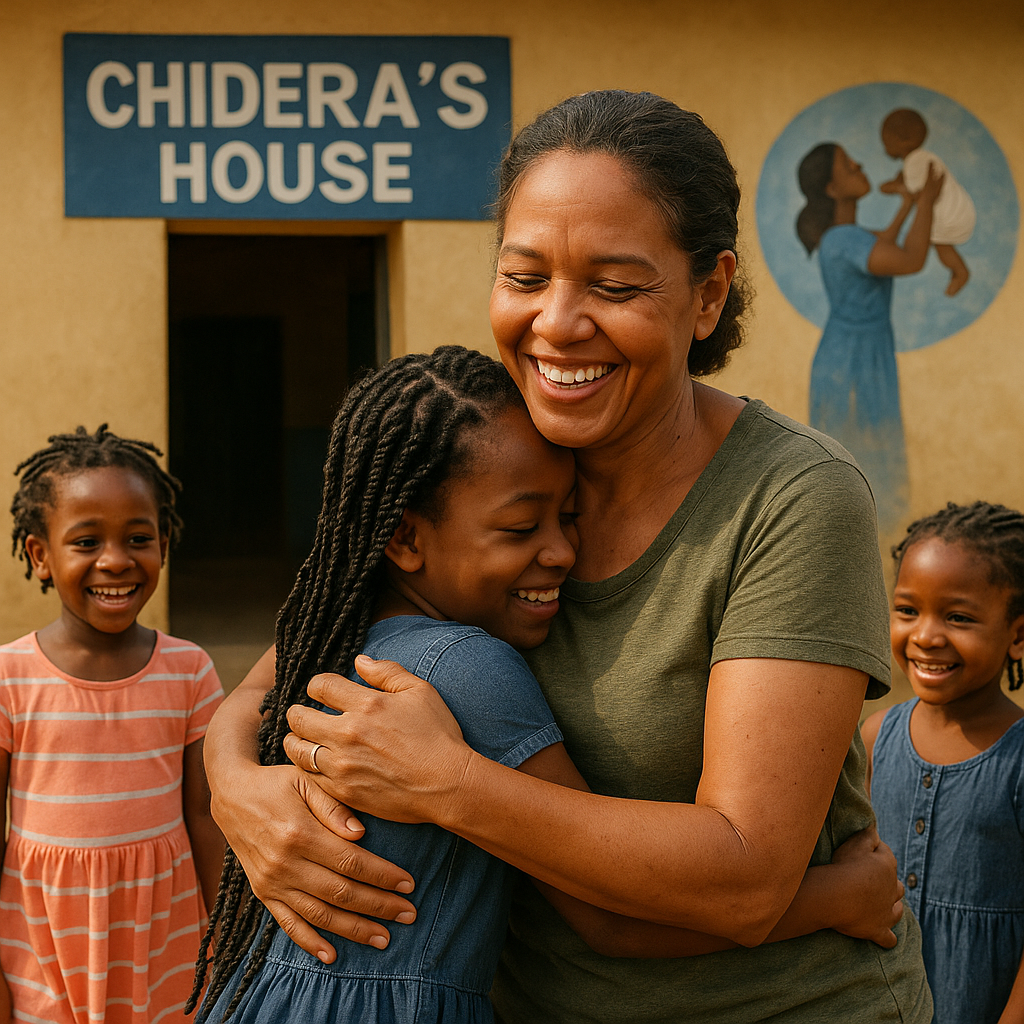
In the school’s main hall, there’s a plaque:
“Chidera’s House — So that no mother cleans up loneliness, and no child is invisible.”
I don’t know if I’ll ever fully forgive.
But I do know this: silence no longer owns me.
And when I sweep the courtyard now, I do it with my head held high.
Because sometimes, the dust you clean up is the same dust you swallow to survive.
But if you speak your truth, that dust becomes a seed.
And from it, trees grow—trees that offer shade to others.
This piece is inspired by stories from the everyday lives of our readers and written by a professional writer. Any resemblance to actual names or locations is purely coincidental. All images are for illustration purposes only.
